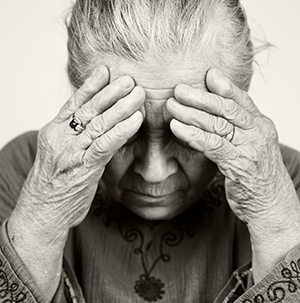As one of our society's most vulnerable populations, the elderly are at heightened risk of abuse. Whether disabled or not, many seniors are unable to resist an abuser's advances, and many fear retaliation if they reach out for support.
For many of us, this fact is hard to confront. And, while tragic, it would be oddly comforting to believe that most elder abuse and neglect occurs in nursing homes or assisted living facilities, at the hands of relative strangers. But the reality of elder mistreatment is more shocking.
Only one comprehensive study has ever been conducted on the extent of elder abuse in America. Completed in 2012, the US Administration on Aging found that a staggering 90% of reported cases of elder mistreatment involved abusive family members.
For more information on elder abuse, visit: https://banvillelaw.com/elderly-self-neglect/
Generally, most cases of elder abuse in which family members are the abuser fall within the purview of criminal courts. Criminal cases exist to enforce laws: the government brings a case  against a person that it believes has broken the law. Several federal, as well as New York State, laws have been enacted to protect seniors from mistreatment and allow for the prosecution of abusers. If you suspect that a family member is abusing a senior in New York, call 1-800-342-3009 to file a complaint.
against a person that it believes has broken the law. Several federal, as well as New York State, laws have been enacted to protect seniors from mistreatment and allow for the prosecution of abusers. If you suspect that a family member is abusing a senior in New York, call 1-800-342-3009 to file a complaint.
Civil cases that involve elder mistreatment are usually filed against nursing homes or assisted living facilities, facilities that failed to adequately protect their residents against abuse.
But the line between civil and criminal liability is often unclear. Speak with an experienced elder abuse lawyer in New York City to discuss your own situation and explore legal options.
Elder abuse that occurs between family members is a subset of domestic abuse. Broadly defined by the US Department of Justice, it involves "a pattern of abusive behavior in any relationship that is used by one partner to gain or maintain power and control over another intimate partner." Domestic abuse relies on intimacy, usually the hallmark of loving relationships, to thrive. According to the Centers for Disease Control & Prevention, a narrower definition of elder abuse would look like:
"any abuse and neglect of persons age 60 and older by a caregiver or another person in a relationship involving an expectation of trust."
An abusive relationship, at least in the CDC's eyes, relies in part on trust. And who do we trust more than our family?
Care-giving relationships are intensely complex and can be fraught with emotional complications. While seniors may suffer at the hands of an abusive adult child or spouse, they may still rely on them for support. And remember, the past, a shared history, weighs on every consideration. Many abused seniors say that they still love their adult children, despite the abuse.
From the other side, most abusive adult children still live with the seniors who they abuse. They often rely on their parents for financial and emotional stability and feeling beholden, or dependent, on another can be the source of feelings as disparate as impotence and rage.
Many abuse victims live in denial of their situation or present a form of the famous "Stockholm Syndrome," in which captives develop a sense of empathy for or sympathy with their captors. And when the abuser is a family member, the very person meant to care for them, seniors may feel as if there is no one who can help.
The AOA's study found that:
In fact, only 1% of these cases involved an "out-of-home service provider," a category that includes the employees of nursing homes. Across all categories of mistreatment, adult children are the most likely to neglect, abuse, or exploit their aging parents. The most common forms were found to be:
Also see: https://banvillelaw.com/federal-nursing-home-regulations/